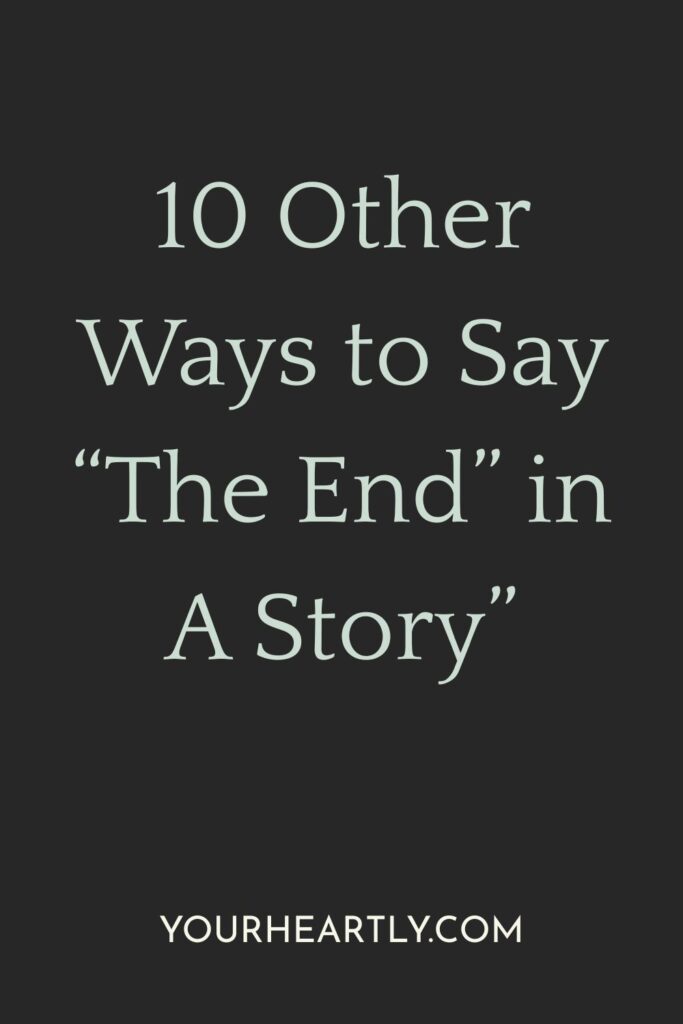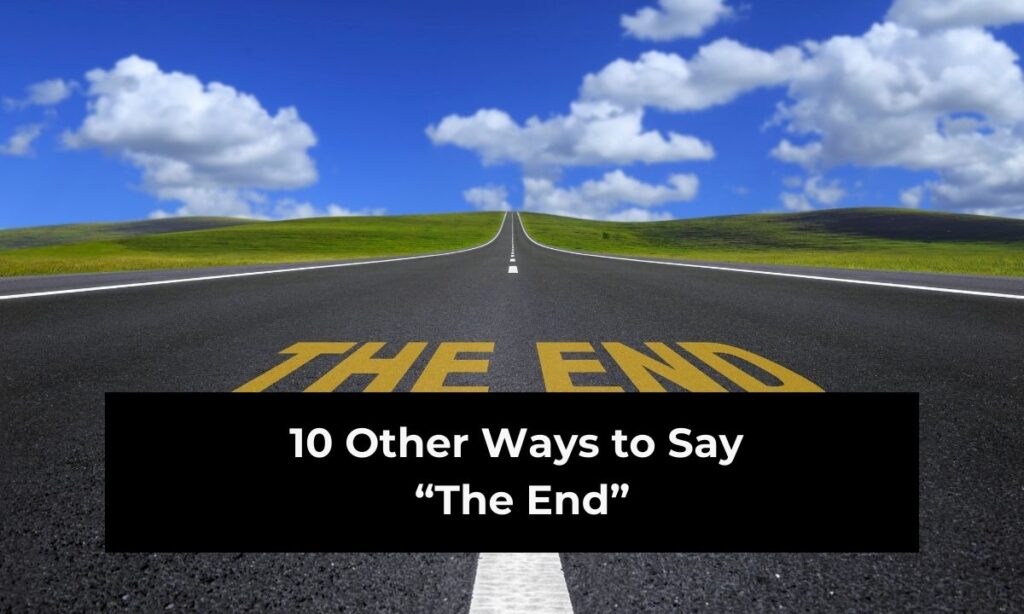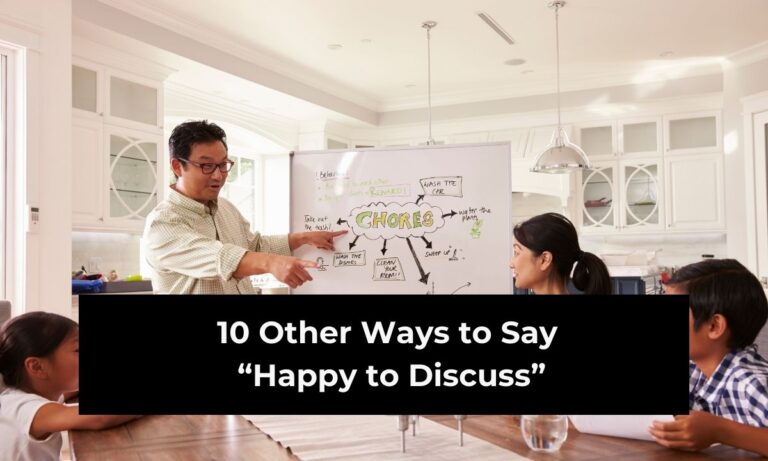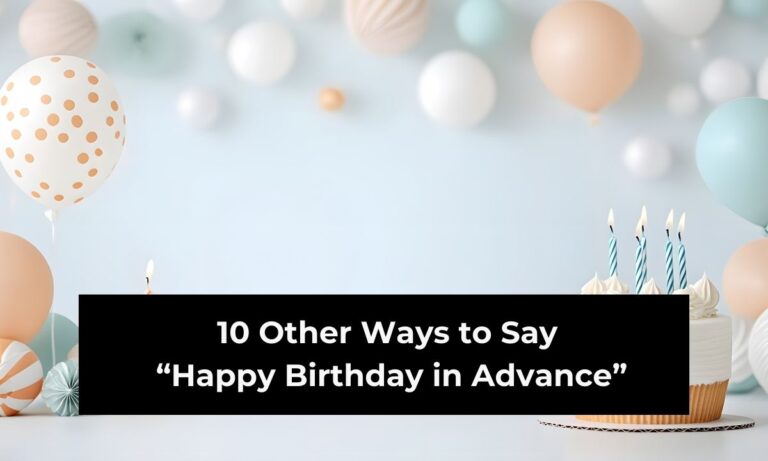When you write a story, the final words you choose matter just as much as the beginning. Think about it—your ending is the last impression you leave with your reader. Saying simply “The End” might work for children’s stories or quick notes, but when you’re aiming for something more creative, emotional, or memorable, you need better ways to close.
If you’re writing short fiction, journaling, blogging, or even working on a novel, the way you wrap up your story can completely shift how your reader feels afterward. A well-chosen closing line can give a sense of finality, hope, mystery, or even inspiration. Instead of leaving your audience with something plain, you can choose words that reflect your story’s tone and leave readers thinking about it long after they’ve finished.

But here’s the challenge—you don’t want your ending to feel forced or cliché. You want something natural that matches your voice and purpose. That’s why it’s helpful to have a collection of alternative phrases ready, so you can pick one that fits your story’s unique mood.

In this article, you’ll discover ten creative, thoughtful, and powerful alternatives to “The End.” Each one is explained with detail, so you’ll not only get the phrase itself but also learn when and how to use it effectively. By the time you finish reading, you’ll have practical tools to craft story endings that feel satisfying, personal, and unforgettable.
Let’s dive in and explore new ways to say goodbye to your story.
1. “And So It Was”
This phrase works beautifully when you want to close your story with a sense of acceptance or inevitability. It suggests that everything unfolded as it was meant to, giving your readers closure while leaving room for reflection.
You can use “And so it was” at the end of stories that lean toward fables, parables, or reflective tales. It has a timeless quality, almost as if the events described could have happened centuries ago or might happen again in the future.
For example, if your story follows a character’s long struggle toward peace or self-discovery, this phrase ties it up neatly without sounding too final. It acknowledges that life has a flow, and the events that just happened were a natural part of it.
In tone, it feels calm and thoughtful. Unlike the abruptness of “The End,” this phrase eases the reader out of your story, almost like a gentle sigh. It’s particularly effective in moral-driven stories, fairy-tale styled pieces, or narratives that feel circular in nature.
If you want your ending to leave the reader nodding in quiet agreement, this phrase is a graceful choice.
2. “The Story Lives On”
Sometimes you want to end your story without really closing it. “The story lives on” creates a feeling of continuity, suggesting that life keeps moving even if the written words stop.
This is a powerful choice for stories with open-ended conclusions, especially those where the characters’ lives clearly continue beyond the page. It leaves space for imagination—your readers can picture what comes next without you spelling it out.
For instance, if you write about a traveler setting out on a new adventure, closing with “The story lives on” implies that their journey continues, even if you aren’t documenting every step. It can also work beautifully in memoir-style writing, symbolizing that personal growth doesn’t end just because the story did.
This phrase adds a touch of mystery and wonder. It feels less like a conclusion and more like an invitation to keep thinking, imagining, or dreaming. Readers who enjoy lingering in the world of your story will love this kind of ending.
By using this phrase, you signal that endings are rarely absolute. Life continues, memories linger, and stories live beyond the last page.
3. “To Be Continued”
If your writing is part of a larger work—like a series, a blog post sequence, or a novel with multiple parts—“To be continued” is the perfect way to finish.
This phrase doesn’t close the door; it opens it wider. It creates anticipation, leaving your readers eager for what’s next. Instead of finality, it sparks curiosity and excitement.
It works particularly well in adventure stories, serialized fiction, or any piece that intentionally leaves questions unanswered. Readers know that more is coming, and that sense of suspense is part of the experience.
Even if you’re not writing a series, you can use “To be continued” in a symbolic sense—suggesting that your character’s journey, growth, or challenges aren’t finished yet. It’s also effective for blog or journal entries, where you may want to revisit the topic in future posts.
The energy of this phrase is bold and forward-looking. It doesn’t let the reader sit still; instead, it propels them into what comes next. If you want to hook your audience and keep them coming back, this phrase is one of the most effective alternatives.
4. “Thus Concludes the Tale”
For a more classic and almost ceremonial ending, “Thus concludes the tale” works perfectly. It gives your story a sense of formality and tradition, making it feel like part of a grand storytelling tradition.
This phrase is excellent for fairy tales, folklore-inspired writing, or historical fiction. It places your story in the lineage of oral storytelling, where each tale was passed down with reverence and ritual.
Using this phrase also sets a certain mood—it tells your reader that what they just experienced was meant to be savored, not rushed through. It suggests importance, as though your story carries a timeless weight.
In modern writing, this phrase can also add a touch of whimsy or nostalgia. It pairs well with stories told in a lyrical or descriptive style, where the language itself has been part of the magic.
If you’re looking to add a touch of drama and elegance to your conclusion, “Thus concludes the tale” is a wonderful way to honor your story.
5. “The Journey Ends Here”
Sometimes the strongest way to close a story is to acknowledge that everything has reached its destination. “The journey ends here” is a phrase filled with finality, but it also carries a sense of accomplishment.
This phrase is ideal for stories centered around quests, adventures, or emotional journeys. It lets your readers know that the characters have arrived at the place they were meant to reach—physically, emotionally, or spiritually.
For example, if your narrative follows someone overcoming hardship, you can close with this phrase to show that they’ve completed their path. It can also be symbolic, marking the end of one chapter of life and the beginning of another.
Unlike “The End,” which can feel abrupt, this phrase offers closure while honoring the journey itself. It focuses not just on finishing but on the process it took to get there.
When you want your readers to feel a sense of resolution, pride, or even quiet satisfaction, “The journey ends here” ties your story together beautifully.
6. “Ever After”
Fairy tales often end with “Happily ever after,” but you don’t always need the “happily.” Simply ending with “Ever after” leaves space for your own interpretation.
This phrase carries a magical, dreamy quality. It works perfectly for stories rooted in fantasy, romance, or whimsical imagination. It suggests continuity, but in a more mythical sense than “The story lives on.”
If you’re writing a love story, ending with “Ever after” can be a poetic way to close, allowing your readers to fill in the details of what happens next. It doesn’t claim that everything is perfect; it simply acknowledges that life continues beyond the page in a story-like way.
This phrase also works well if you want your ending to feel timeless. It pulls your story slightly out of the ordinary and places it in the realm of folklore or dreams.
If your goal is to leave readers with a soft, lingering sense of wonder, “Ever after” might be the perfect way to finish your story.
7. “Here Ends the Chapter”
Stories don’t always need a full stop; sometimes, they just need a pause. “Here ends the chapter” is a phrase that provides closure while acknowledging that life continues in other directions.
This phrase works especially well for autobiographical writing, reflective journaling, or novels that span different phases of life. It captures the idea that even though one season or event is complete, the larger story is still unfolding.
It’s also a versatile phrase. You can use it literally in books divided into chapters or figuratively to mark the end of a significant event or turning point.
The feeling it gives is both satisfying and transitional. Your readers will recognize that this part of the story is wrapped up, but they’ll also sense that new beginnings lie just beyond it.
By choosing this phrase, you make your ending feel both complete and open-ended at the same time—perfect for stories rooted in growth, change, or transformation.
8. “Until We Meet Again”
When you want your story’s ending to feel personal and warm, “Until we meet again” is a heartfelt choice. It sounds less like a final goodbye and more like a temporary parting.
This phrase is excellent for stories written in first person, especially when there’s a direct connection between narrator and reader. It builds intimacy, as if the storyteller is stepping away for now but intends to return.
It also works well in reflective, emotional, or nostalgic writing. If your story feels like a conversation, this phrase continues that tone right up to the very last line.
Readers will appreciate the comfort in these words. Instead of being pushed away with an abrupt ending, they’ll feel like they’re parting on friendly terms. It keeps the door open and creates a gentle sense of continuity.
If you want your ending to feel warm, approachable, and personal, “Until we meet again” is a wonderful alternative.
9. “The Curtain Falls”
Borrowed from the theater, “The curtain falls” creates a dramatic, elegant ending for your story. It signals that the performance is over, while also acknowledging the artistry of storytelling itself.
This phrase is perfect for dramatic fiction, poetic prose, or any story where you want to emphasize performance, drama, or spectacle. It frames your work as something staged and intentional, which can add a layer of richness to the reading experience.
It’s also a phrase filled with visual imagery. Readers can almost picture the stage lights dimming and the curtain lowering. That image alone can make your ending more powerful and memorable.
This phrase works best when your story carries strong emotion or tension. Ending with “The curtain falls” gives readers a sense of finality, like the applause at the end of a play.
If you want your story’s ending to feel both artistic and impactful, this phrase delivers exactly that.
10. “And They Lived On”
A softer variation of “Happily ever after,” this phrase acknowledges continuity while keeping things more grounded. “And they lived on” doesn’t promise perfect happiness, but it suggests resilience, growth, and endurance.
This phrase works well for realistic fiction, reflective writing, or stories where characters face challenges but ultimately carry forward. It leaves space for hope without making unrealistic claims about happiness.
Readers often resonate with this kind of ending because it mirrors real life—things don’t end neatly, but people keep living, learning, and moving forward.
You can use this phrase to close on a bittersweet or hopeful note. It acknowledges struggle while pointing toward survival and continuation.
If you want your story to feel meaningful, relatable, and emotionally true, “And they lived on” is a strong, heartfelt choice.
Conclusion
The ending of your story is more than just a closing line—it’s the final emotion you gift your reader. Saying “The End” is fine, but it can feel too simple, too abrupt, and sometimes uninspired. By choosing a more thoughtful phrase, you can match the mood of your story, inspire reflection, and leave readers with something to carry away.
Whether you want elegance with “Thus concludes the tale,” hope with “The story lives on,” or intimacy with “Until we meet again,” each phrase gives your story a unique way to close. The key is choosing the one that fits your narrative best.
Writing is about connection, and the way you end your story has the power to deepen that connection. The next time you finish a story, pause and think: how do I want my readers to feel as they turn the final page? Pick a phrase that delivers that feeling, and your ending will be unforgettable.
FAQs
1. Why shouldn’t I just use “The End” in my story?
You can, but it often feels generic. Choosing a different phrase can make your story’s ending feel more intentional and memorable.
2. Can I use these phrases in children’s stories?
Yes! Phrases like “Ever after” or “Thus concludes the tale” work especially well for children’s books.
3. How do I choose the right phrase for my story?
Think about your story’s tone. Is it dramatic, whimsical, hopeful, or reflective? Pick a phrase that mirrors that feeling.
4. Are these phrases only for fiction?
Not at all. You can use them in memoirs, blog posts, speeches, or any form of storytelling where a strong ending matters.
5. What if my story is part of a series?
That’s when phrases like “To be continued” or “Here ends the chapter” work best, since they leave space for what’s next.





